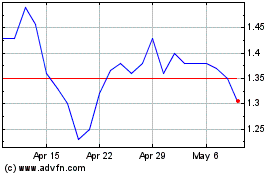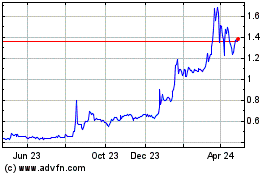Excerpts: Report on Financial Crisis
March 13 2016 - 6:34PM
Dow Jones News
New documents on the 2008 financial crisis reveal some unusually
frank assessments and admissions by key figures. Here are some
excerpts from the documents, released Friday by the National
Archives following a five-year embargo.
Warren Buffett didn't see the bubble
Of the nearly 200 interview transcripts released Friday, one of
the most striking is the full transcript of a May 26, 2010,
interview with Warren Buffett on the causes of the financial
crisis. Mr. Buffett said he missed the housing bubble like most
other Americans: "If I had seen what was coming, I would have
behaved differently," he told the commission. Asked whether
monetary policy caused the financial crisis, Mr. Buffett said no.
"I think the primary cause was an almost universal belief, among
everybody and I don't ascribe particular blame to any part of
it--whether it's Congress, media, regulators, homeowners, mortgage
bankers, Wall Street, everybody--that house prices would go
up."
Paulson blasts Fannie, Freddie
Former Treasury Secretary Henry Paulson called the business
model for Fannie Mae and Freddie Mac--private housing-finance
companies with government charters--"perverse" and seemingly
inconceivable. Their flaws, he said, were "flimsy capital" and a
regulator with no power. The companies had a "very bad model with
very bad incentives...it's not just that the elephant was too big
for the tent--the elephant was ugly!" he said.
Greenspan unbowed
Former Federal Reserve Chairman Alan Greenspan defended the
central bank's actions in the lead-up to the financial crisis,
saying Fed officials are often no better at predicting the future
than the rest of us. "Could we have done better? Yes, if we could
forecast better. But we can't," he told the commission's staff,
adding that the Fed's Board of Governors had got a bad rap. "Who
was not culpable?" he asked. "If you wrote them down, you'd have a
blank sheet of paper."
Did Ken Lewis save the world?
That's Mr. Buffett's view. He points out that if the Bank of
America CEO hadn't bought Merrill Lynch in the days following the
failure of Lehman Brothers, "the system would have stopped." He
muses about writing a fictional book titled "If Ken Lewis Hadn't
Answered the Phone," telling a story about what would have
happened. "It would be a hell of a book. I'm not sure what the
ending would be."
Blankfein confronts leverage
Goldman Sachs CEO Lloyd Blankfein acknowledged he didn't
understand leverage as a "meaningful metric" to gauge the financial
condition of his company, according to a paraphrased June 2010
interview. "Until recently, I wasn't even conscious of what our
leverage was, in the sense of, the amount of our gross assets
versus our equity," he said. "I always thought of it in terms of
risk of the way our balance sheet was run."
Tell us how you really feel
I n a 2010 interview with the commission, John Reed, the former
Citigroup chief executive, let loose. Among his opinions: The
structure of combining retail and investment banking--basically,
Citigroup's entire model--is questionable. Sandy Weill wasn't the
right person to be CEO. And neither was Chuck Prince. Neither Mr.
Weill nor Mr. Prince was available for comment.
Perceptions become reality
Former Citigroup CEO Vikram Pandit said he watched as the stock
price of his bank dropped from $10 to $3 from one Friday to the
next. Mr. Pandit said the lesson for him was that capital strength
mattered. He thought Citi had enough capital, but in a
dysfunctional market it wasn't enough.
Hide the ball
Regulatory conflict may have been worse than understood. One
document reveals how regulatory turf battles created the conditions
that allowed excessive risk to build in the financial system. Mike
Macchiaroli, director of trading and markets at the Securities and
Exchange Commission, said Fed staff "hid some documents from the
SEC," according to a summary of his interview, because the Fed
staff was worried that documents would be viewed by SEC examination
staff. Fed General Counsel Scott Alvarez told investigators that
part of the problem stemmed from Fed officials' worries that if
they divulged information uncovered in a bank exam, it could end up
coming back to bite the firm when the SEC examined its financial
disclosures.
"We were concerned that our examiners' judgments, how we should
rate someone on an exam, would affect how the SEC would look at the
proxy statements for the broker company," he said, according to a
transcript.
--Ryan Tracy, Donna Borak, Christina Rexrode, Rachel Witkowski
and David Harrison
(END) Dow Jones Newswires
March 13, 2016 18:19 ET (22:19 GMT)
Copyright (c) 2016 Dow Jones & Company, Inc.
Federal Home Loan Mortgage (QB) (USOTC:FMCC)
Historical Stock Chart
From Mar 2024 to Apr 2024

Federal Home Loan Mortgage (QB) (USOTC:FMCC)
Historical Stock Chart
From Apr 2023 to Apr 2024
